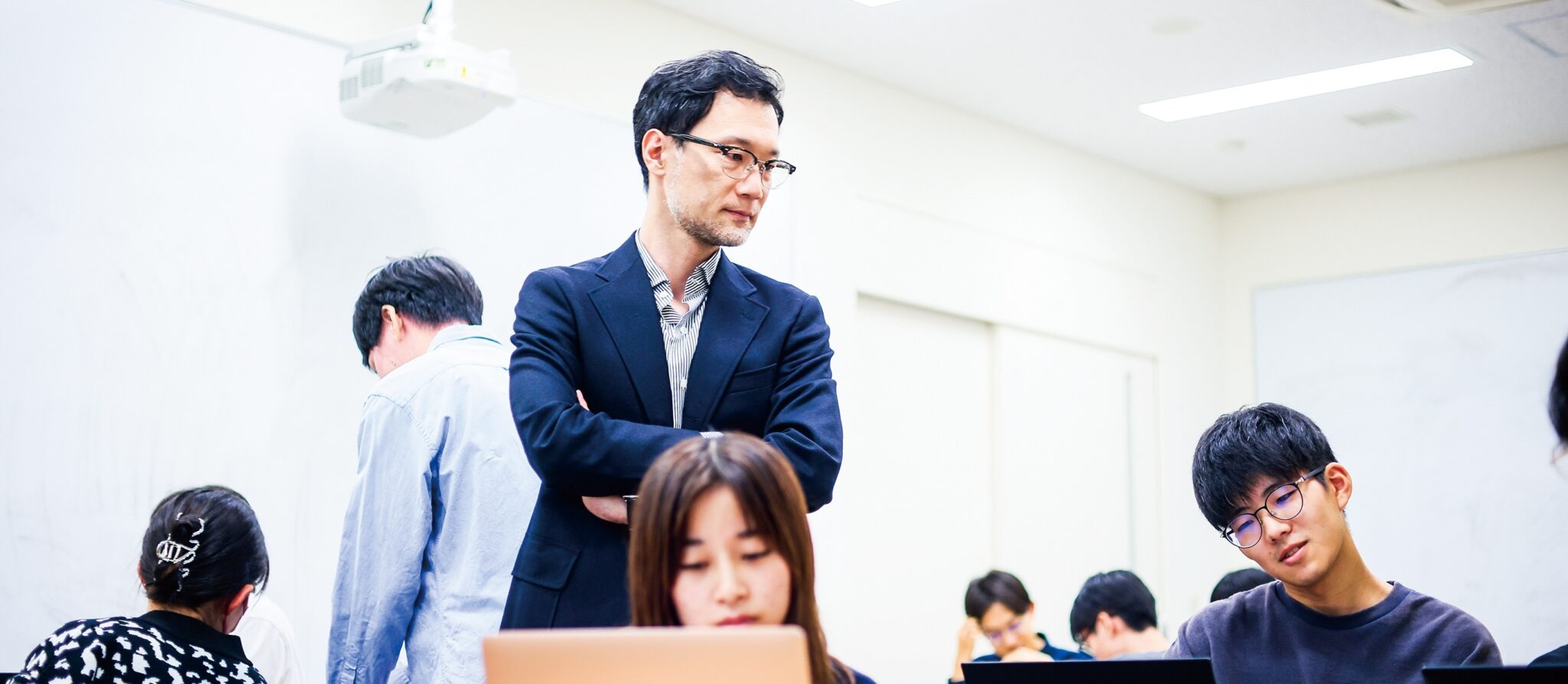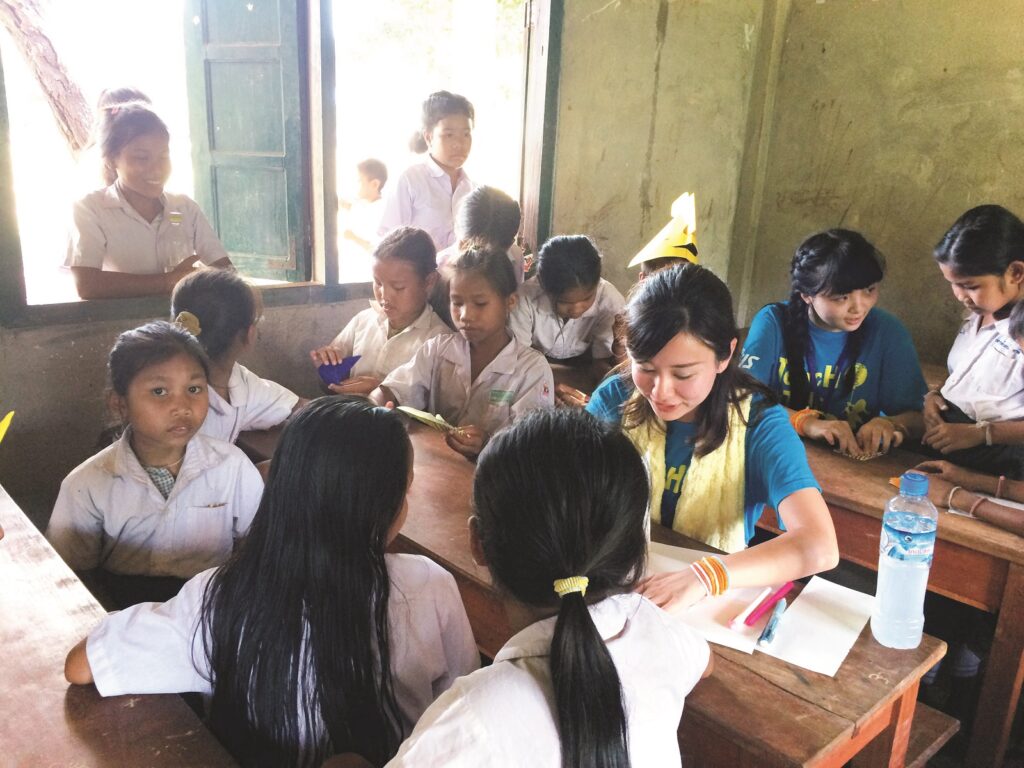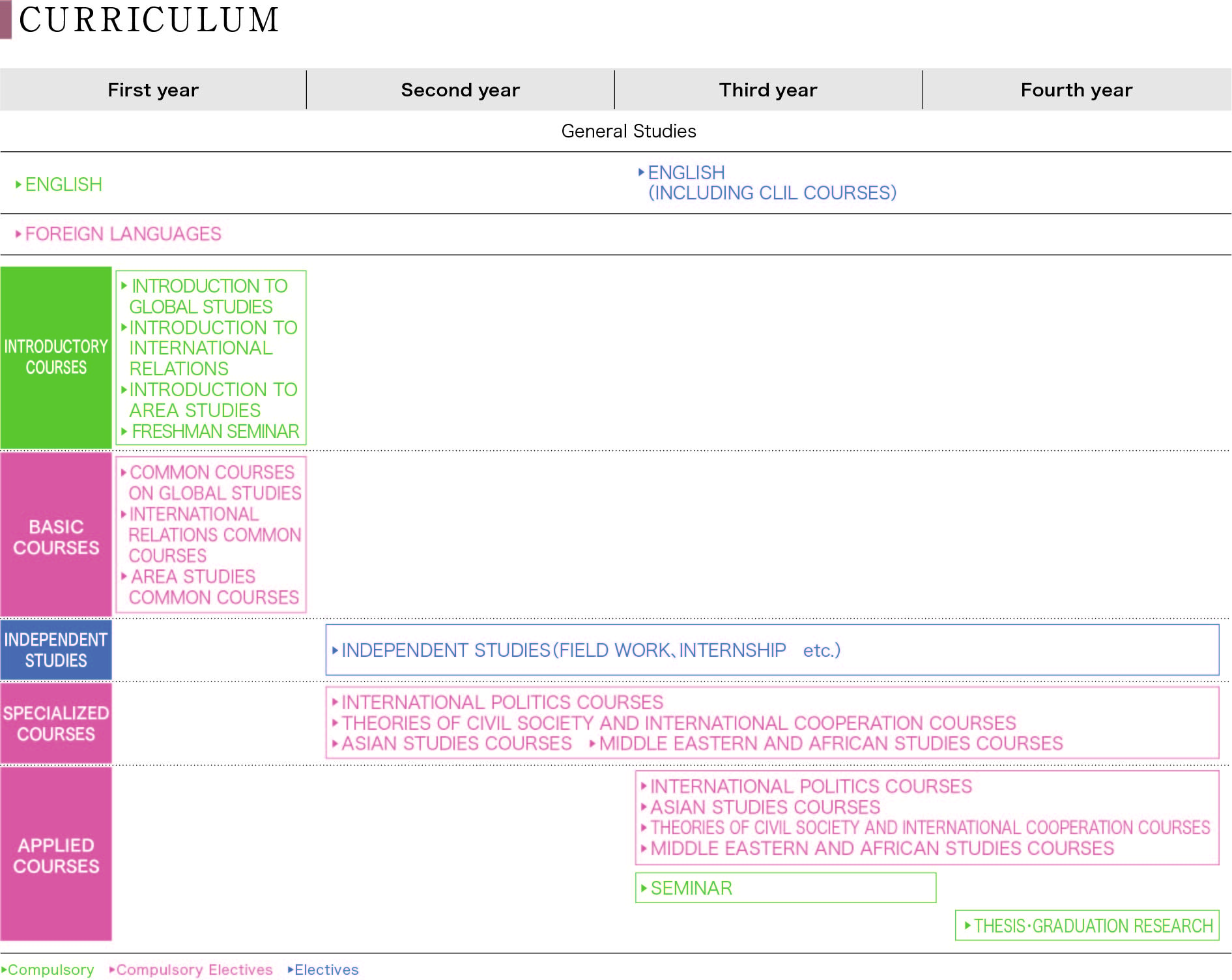Department of Global Studies


Department Features
In the face of today’s whirlwind of informational exchange on a global scale, let us strive to achieve the free movement of goods, people, and money while protecting the uniqueness and individuality of each culture, tradition, and society. The Department of Global Studies is for students to cultivate this mindset and apply it to their career paths. Through a complex, multidimensional curriculum, the program aims to provide a rich environment to attain both macro and micro perspectives on regional development, which fully equips motivated students with knowledge, discipline, morals, and intelligence to put their ideas into action and opens up the possibility of further discourse. It is our hope that our students will contribute to realizing a truly global, inclusive society in which they can live together with the people of the world.
The Department of Integrated Global Studies offers a degree program in English (Sophia Program for Sustainable Futures [SPSF]).
A leading force of global studies: Looking at the world with two different approaches to gain a solid grasp of global society.
Cultivating the internationality of students has been an important educational objective of Sophia University since its founding. With the honor of the name “Sophia—true wisdom,” our educational endeavor is solely focused on realizing our belief that true wisdom is a universal language in the strictest sense. The Global Studies that we have established at Sophia over time have finally come to fruition with the founding of the Faculty of Global Studies, which is the newest center of Global Studies.
- International Relations
International Politics
Civil Society & International Cooperation
- Regional Studies
Asian Studies
Middle-Eastern and African Studies
North American Studies* European Studies*
Latin American Studies* Russian and Eurasian Studies*
*This is a research course offered by the Faculty of Foreign Languages.

The department’s foremost goal is for students to acquire a multifaceted perspective of the world. To this end, we emphasize small-group exercises and independent research, with regional studies as the dual focus for thinking on a global scale, and provide open learning that invites students to the world of theory and practice of global studies. How does your life connect to the world? The Faculty of Global Studies is for students who wish to dig deeper into these questions and apply what they discover to their future.
Learning in the Faculty of Global Studies
Students in the Faculty of Global Studies start their educational journey with a comprehensive study of global studies, and from the second year, they study two areas of International Relations (International Politics, and Civil Society & International Cooperation) and two areas of Region Studies (Asian Studies and Middle-Eastern and African Studies), in accordance with their interests. In the third year, students choose one of these four areas as their major, participate in Seminar classes for each area (mandatory in the third year but elective in the fourth), and complete their studies by writing their graduation thesis in the fourth year. At the same time, students will choose one area as a minor from a different lineage than the one to which their chosen area belongs, and effectively combine that study with the major to complete their own global studies.
Curriculum
The Department of Global Studies is a new complex academic field unique to this university, in which International Relations (global), Regional Studies (local), and Global Studies, a fusion of these two fields, are explored as a trinity. Beginning with a comprehensive study of Global Studies, students study two areas of International Relations (International Politics and Civil Society & International Cooperation) and two areas of Regional Studies (Asian Studies and Middle Eastern and African Studies) from their second year onward, according to the depth of their interests.
In the third year, students select one of these four areas as their major and another area in a different field as their minor. Students then take seminar, and in the fourth year, the results of their studies are presented in the form of a graduation thesis. In addition, the curriculum emphasizes independent research and foreign language acquisition (English and regional languages).
as of 2022
*Please refer to the syllabus for more information on the subjects
*Major areas of study will be finalized according to the Seminar choice. Because there is a limit to the number of places available in the Seminar program, not all students can be placed in their first choice of Seminar program. As a result, the major and minor areas may differ from the desired area.
What to aim for, what to learn. Integrated Global Studies Course Model
1) Seeking a career in a trading company
Having a deep interest in international politics surrounding energy resource issues, a student took courses focusing on international political theory. By studying the relationship between China as a rising global player and the Middle-East and Africa as resource-rich areas, the theme of the student’s graduation thesis was “China’s Measures Against Africa: Focusing on Energy Strategies.” The student made the most of this interest and knowledge to work for a trading company involved in the resource development business.
-
Chinese Politics & Foreign Policy 1,2
Analyzes China’s political diplomacy from the perspectives of security and external economic relations, bilateral and multilateral relations with leading nations, diplomacy in regional and international organizations, and relationship with the international order.
Global Governance 3,4
Outlines the basic structure and institutions of international governance and discusses new developments (cross-border issues such as trade, de-national issues such as the environment, and domestic issues addressed by the international community such as peacebuilding).
International Economics 1
Students will learn the basic concepts of economics (market mechanisms) and the basic theory of international cooperation (trade theory) as tools for understanding the nature of the globalized economy and the various problems that arise from it.
-
Development Studies of Africa
Studies on the current situation, achievements, and challenges of international cooperation efforts in the Sub-Saharan region by addressing the issues of poverty, hunger, conflict, refugees, environment and other areas, and the resulting transformation of local communities.
Politics in Africa
With reference to the paradoxical principles of international relations in the modern era, this course examines the challenges faced by post-independence African nations in state management and building nation-states from the perspectives of both African politics and international relations.
2) Seeking a career in an NGO
A student focused on Asian Studies courses to learn about the history, culture, and society of Southeast Asia. Having an interest in poverty issues in Cambodia, the student took Civil Society & International Cooperation as a minor area to study theories and approaches to development and poverty issues. For the graduation thesis, the theme was “Tourism and the Poor in Cambodia.” The student now works for an international NGO to address poverty issues from the locals’ perspective.
-
Modern History of Southeast Asia 1,2
This course reviews the modern and contemporary history of Southeast Asia and examines the political, historical, and economic characteristics of each country. The goal is to shed light on various issues between Japan and Southeast Asia and consider the prospect of the relationship.
Environment and Development in Asia
Issues concerning the environment and development in Southeast Asia, particularly the issues of tropical deforestation and loss, biodiversity, and plantation development, will be studied in the context of the history and the ecosystem usage of the society.
Preservation and Cultural Heritage
Through learning about the history, international norms, politics, and current local conditions and issues of international cooperation in the field of cultural heritage preservation, we aim to gain both the global and local perspectives necessary for international cooperation.
-
International Political Economy (Economical Approach) 1,2
An overview of the issue of poverty, the current situation of third world poverty, the proactive movement of the underclass themselves and its possibilities, and the role of citizens, NGOs, the state, and international organizations working to eliminate poverty are discussed from the perspective of the underclass.
International Cooperation 1,2
Focusing on grassroots cooperation, the course helps students to understand the significance of the shift from economic development to human development and consider better development based on various approach such as participatory development, empowerment, etc.
Course Examples
- Introduction to Global Studies
This is a new integrated academic field that combines the global perspective of international relations theory with the local perspective of area studies so that students can acquire knowledge and understanding of world issues, in order to comprehend the globalizing world. As an introduction to the course, students will study various issues from the perspectives of international relations, political science, economics, sociology, history, anthropology, region studies, Asian studies, and Middle-Eastern and African studies.
- Freshman Seminar
In small classes of about 10 people, students familiarize themselves with university educational methods, which differ greatly from those of high school. With all five senses and bodies to read, think, search for materials, gather materials, discuss, and write, students confirm their interests, identify themes, and acquire the necessary knowledge-acquisition techniques (skills and methods). This becomes a roadmap for them to pursue independent and autonomous research after the second year.
- Independent studies
Students will study various issues in global society based on their own set of tasks and plans. With the guidance of the faculty member in charge, students will conduct fieldwork, internships, volunteer work, and literature research, and submit a final product. This is a subject unique to the Faculty of Global Studies, which emphasizes independence, free thinking, and a spirit of challenge.
- Seminars, graduation thesis, etc.
Both the third-year Seminar and the fourth-year graduation thesis are required, and in principle are taught by the same faculty member. Through Seminars and literature studies, students deepen their research by discussing the themes with other students and faculty and produce a graduation thesis as the culmination of their four years of study. The themes of past students’ graduation theses are available on the department’s website.
Available Teaching Licenses and Subjects
- Junior high school teacher (social studies)
- High school teacher (civics)
Curatorial courses are available.
Educational Objectives and Policies
-
SPSF International Relations
To equip students, through systematic study of courses offered in the International Relations and Area Studies degree programs, with (1) understandings of globality, (2) understandings of locality, (3) proficiency in multiple languages (English and regional languages), and (4) negotiating skills grounded in ethical awareness.
SPSF Area Studies
To equip students, through systematic study of courses offered in the Area Studies and International Relations degree programs, with (1)understandings of globality, (2) understandings of locality, (3) proficiency in multiple languages(English and regional languages), and (4)negotiating skills grounded in ethical awareness.
-
To produce graduates (international public intellectuals) capable of addressing both positive and negative facets of globalization, and contributing to the development of a collaborative society in which all people of the world move forward in partnership.
-
SPSF International Relations
The Faculty of Global Studies sets standards for the skills and knowledge that students who aim to become international public intellectuals seeking to achieve a fair society that protects human dignity in the globalizing world today. Those who fulfill the graduation requirements shall be deemed to have acquired these qualities and will be awarded a diploma.
- An interest in social security, conflicts, poverty, development, immigrants, refugees, global environment, etc. and the ability to explain why such issues need to be solved globally.
- The ability to understand the approaches and overall theory of International Relations Studies and Area Studies and consider issues from both perspectives combined.
- The ability to shape problem-solving methodology analyze the positive and negative aspects of globalization in line with concrete case studies, using basic theories and demonstrative methods.
- The ability to set up and explore subjects combined with Area Studies, while specializing in International Relations, dealing with International Politics, International Sociology, Economics, International Cooperation, International Education, etc.
- The ability to engage in dialogue with various others who live in different parts of the world and to cooperate in solving problems for the creation of an inclusive society.
SPSF Area Studies
The Faculty of Global Studies sets standards for the skills and knowledge that students who aim to become international public intellectuals seeking to achieve a fair society that protects human dignity in the globalizing world today. Those who fulfill the graduation requirements shall be deemed to have acquired these qualities and will be awarded a diploma.
- An interest in social security, conflicts, poverty, development, immigrants, refugees, global environment, etc. and the ability to explain why such issues need to be solved globally.
- The ability to understand the approaches and overall theory of Area Studies and
International Relations studies and consider issues from both perspectives combined. - The ability to shape problem-solving methodology analyze the positive and negative aspects of globalization in line with concrete case studies, using basic theories and demonstrative methods.
- The ability to set up and explore a subject combined with International Relations, while
specializing in Area Studies, studying a specific region (Asia and the Middle East/Africa) within an international society where globalization is accelerating.The ability to set up and explore a subject combined with International Relations, while specializing in Area Studies, studying a specific region (Asia and the Middle East/Africa) within an international society where globalization is accelerating. - The ability to engage in dialogue with various others who live in different parts of the world and to cooperate in solving problems for the creation of an inclusive society.
-
SPSF International Relations
In accordance with the Diploma Policy, the Department of Global Studies constructs its curriculum with courses aligned with the following purposes:
- To have students study Global Studies and the basics of International Relations and Area Studies that support it in lectures, and thus acquire core theories and methodologies as well as fundamental research skills and approaches.【Course numbers 100-199】
- To have students understand the dynamics of international politics and economy, and learn in lectures about the mechanism of international cooperation and civil society, and thus prepare for selecting their specialties【Course numbers 200-299】
- To have students learn about Asia, the Middle East and Africa, etc. from the perspectives of history, culture, politics, economics, etc. in lectures and thus prepare for selecting their specialties.【Course numbers 200-299】
- To have students select one area of International Relations -International Politics or Civil Society and International Cooperation -and one from Area Studies, including the two branches, Asia and Middle East and Africa, and have them conceptualize and implement solutions to global issues through lectures, etc.【Lecture Course numbers 300-499】
- To have students actively set up individual research questions regarding globalization issues and present relevant research results in academic papers and other clear forms.【Self-motivated research: 200-299; Seminars: 400-499; Thesis and research: 400-499】
- To have students acquire a supportive attitude toward the theme-based research of other individuals through small-group seminars where they can deepen mutual understanding through debate.【Basic Seminar numbers 100-199; Seminars 400-499】
- To have students enhance their proficiency of English, the language commonly spoken internationally, by taking English-taught courses, as well as to acquire multilingual skills by encouraging them to learn foreign languages other than English.【Lecture Course number 200-】
SPSF Area Studies
In accordance with the Diploma Policy, the Department of Global Studies constructs its curriculum with courses aligned with the following purposes:
- To have students study Global Studies and the basics of Area Studies and International Relations that support it in lectures, and thus acquire core theories and methodologies as well as fundamental research skills and approaches.【Course numbers 100-199】
- To have students learn about Asia, the Middle East and Africa, etc. from the perspectives of history, culture, politics, economics, etc. in lectures and thus prepare for selecting their specialties.【Course numbers 200-299】
- To have students understand the dynamics of international politics and economy, and learn in lectures about the mechanism of international cooperation and civil society, and thus prepare for selecting their specialties.【Course numbers 200-299】
- To have students select two areas from Area Studies and International Relations Studies as their disciplinary specialties and have them conceptualize and implement solutions to global issues through lectures, etc.【Lecture Course numbers 300-499】
- To have students actively set up individual research questions regarding globalization issues and present relevant research results in academic papers and other clear forms.【Self-motivated research: 200-299; Seminars: 400-499; Thesis and research: 400-499】
- To have students acquire a supportive attitude toward the theme-based research of other individuals through small-group seminars where they can deepen mutual understanding through debate.【Basic Seminar numbers 100-199; Seminars 400-499】
- To have students enhance their proficiency of English, the language commonly spoken internationally, by taking English-taught courses, as well as to acquire multilingual skills by encouraging them to learn foreign languages other than English.【Lecture Course number 200-】
-
The Faculty of Global Studies welcomes students who will engage in proactive efforts to build on their intellectual interests and motivation, and endeavor to contribute to the creation of a global inclusive society, as described below:
- Those highly interested in the positive and negative dimensions of a globalizing world and have acquired a certain level of knowledge in high school classes associated with Modern Society.
- Those highly interested in the richness of human society and culture created by the diversity of regions and people constituting the world who have acquired a certain level of knowledge in high school classes associated with Geography and World History
- Those who can approach matters with evidence-based logical thinking and who have made continued efforts to address matters independently
- Those who bear the English skills to read and comprehend the basic literature required to understand globalization trends
Faculty Members
International Politics
Yasuko TSURU Professor

Shino WATANABE Professor

Civil Society and International Cooperation
Nanako INABA Professor

Masatsugu SHIMOKAWA Professor

Ryo TAKASHIMA Professor

Tobias WEISS Associate Professor

Asian Studies
Hiroko KUSHIMOTO Associate Professor

Hyangsuk KWON Associate Professor

Chie SAKURADA Assistant Professor

Middle Eastern and African Studies
Fumiko SAWAE Professor

Momoka MAKI Professor

Akihiko YAMAGUCHI Professor

Mikako TODA Associate Professor

